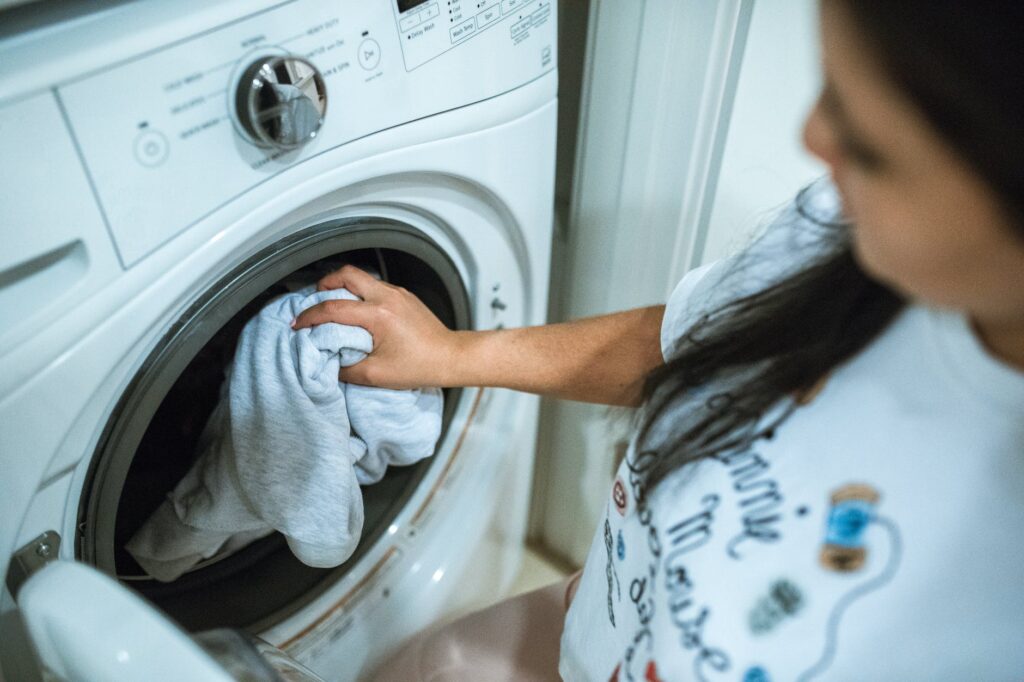Easy Hacks For Washing Your Sheets And Bedding – How Often Should You Wash Your Sheets?
After a long day, who doesn’t love sleeping under nice, clean, and crisp sheets?! We spend a third, or more, of our time in our bed, but it can be easy to forget to change your sheets or not realize how much time you are spending “wearing” your sheets every day! But how often should you wash your sheets? What are the best ways to wash your sheets and bedding? What is the difference in detergent vs soap?! We cover that and more below.
How often should you wash your sheets and bedding?
Let’s get right to it. So how often should you wash your sheets or bedding? According to Queer Eye star Bobby Berk, every 2 weeks is fine. This is except if you have pets or other considerations where washing weekly, or more frequently, could be best. For bedding that is inconsistently or not often used, monthly or other frequencies may make better sense.
Use this table to review some considerations for how often you should wash your sheets and bedding. Anything we missed let us know!
| How Often You Should Wash Your Sheets | Considerations |
|---|---|
| Wash your sheets weekly | Pets sleeping in bed Allergies Dirty jobs (medical, first responders, farming, construction) Medical conditions Longer time in bed (more naps or irregular patterns) |
| Wash your sheets every 2 weeks | Normal sleeping patterns |
| Wash your sheets monthly | Vacation homes Rarely used rooms or beds |
Best ways to wash your sheets
Sure, you can throw your sheets in the washing machine and use the same old detergent, but is this the best way to wash your bedding? Here is what to avoid, try, and consider when washing your sheets!
First, when you wash your sheets make sure to understand detergents vs soaps. See below.
After the washing cycle, now is time to dry. Before you jump and throw in that dryer sheet, Bobby Berk and many others suggest avoiding dryer sheets and softeners. These commonly used products can leave behind residue, which may not be the best for sensitive skin. These chemicals and residue may not only can be uncomfortable, but can irritate skin and make allergy prone people itch, sneeze, scratch and more. A more environmentally friendly, and sensitive skin friendly, option is homemade dryer sheets or wool balls. We have noticed some wool balls can shed, so spend a bit extra on quality options
Dryer Ball Options
Bob Vila – Best Dryer Balls – There are several options on Bob Vila’s site from wool to silicone, extra large options and even scented. Not all dryer balls are made the same, and you may have heard negative reviews on some brands or styles. A common complaint of wool balls is the shedding, and some poorly made dryer balls can be made from plastic and melt. Before you have a nightmare on your hands, try a few highly rated products from the pro, Bob Vila. Here are a few choices from his site and links to Amazon for ratings:
S&T Inc Reusable Dryer Balls – Under $10. Mostly 5 star reviews. One review did mention the dye came off in their dryer so use caution.
Woolzies Organic Wool Dryer Balls– With Scented Oils (Lavender, Orange, Lemon) $19 on Amazon
Homemade Dryer Sheets
Making your own dryer sheets is fairly easy. Pinterest has several “recipes” to get started. Find an old glass jar or air tight container, some old fabric (shirts, sheets, sponges) to cut up, and boom! Instant DIY dryer sheets.
Need something even easier? Coffee filters and a bit of liquid softener.
Many recipes call for hot water, vinegar, baking soda and your personal choice of essential oils. Some just call for vinegar, water and essential oils. Best to test a few out to see what works for your own preferences, materials and needs.
What is “laundry stripping”?
You may have heard of this “hack” for laundry called Laundry Stripping. What exactly is it and why do it? Does it impact how often you should wash your sheets?
Laundry stripping is a method to remove residue and chemicals from your laundry. This is a very aggressive cleaning method meant to “strip” these chemicals and residues (think laundry softener chemicals, soils, oils, dirts etc) from laundry that regular washing won’t always remove. Some people choose to do this just because they want “clean” laundry, and some do it because of ground in smells and odors, or that their laundry doesn’t feel right after all the washings.
Regardless of your reasons, people rave about the effectiveness. But some experts say laundry stripping is terribly ineffective and can be harmful to clothes and fabrics. It isn’t terribly necessary to do on a frequent basis. We like to strip our laundry if it sat in the hamper too long and the body oils have lead to scents that washing just won’t remove.
There are different ways of doing laundry stripping, some more aggressive than others. Make sure to test and trial how you do your laundry, as we cannot guarantee how yours will react or even how your machine will handle some of these methods.
Smelly Fabrics
Using vinegar or baking soda to help remove odors. For more pungent smells, try soaking or different methods of vinegar and baking soda to find the right solution. Last, let it dry in the sun!
Fabrics Feel Off
This can be a great option for towels or bedding that has been in one too many washing cycles. Try these Good Housekeeping tips for laundry stripping towels.
What is the difference in laundry detergent vs laundry soap?
While both soap and detergents clean, they do so differently. Choose your right tools so you can get the right results for your laundry and fabrics!
Laundry detergents and soaps differ in their ingredients. Detergents tend to have synthetic chemicals while soaps are made with biodegradable ingredients such as oils, fats or lyes (source ohsospotless.com). Detergents can have more scents added such as oils to improve the smell.
Soaps and detergents work by breaking up and removing grease, dirt and other unwanted grime then washing it away with the water in the cycle. The main difference is in the ingredients and the effectiveness of cleaning. Soap can do a great job of cleaning clothes, but may not get those whites as white or remove stains as well as a detergent will that is manufactured to these specific concerns. Detergents may not always be biodegradable, so if you are looking for more environmentally friendly options, many choose soaps for their washing concerns.
The type of water you are washing in may be of note too, as soaps may not always do well in hard water. If hard water is a concern and you want to use soap, make sure to shop with that in mind. With improvements in technology, many laundry soaps are doing better at tackling stains and working in any water condition. The same can be said for detergents, as these have come a long way in being more environmentally friendly and addressing concerns.

Now I know how often should I wash my sheets, what else?
Choosing the right materials to wash your sheets: from the right washing machine to the right soap or detergent, can impact how long between washes. When things get smelly, letting your fabrics dry in the sun can help kill any odor causing bacteria…for free. Sometimes even Mother Nature can’t help, which is a great time to try some of the other techniques such as soaking in vinegar or baking soda, or going full on into laundry stripping.
Regardless of your needs, keep trying tips and tricks to find the best way to keep your laundry smelling great, feeling amazing, and lasting a long time. We all spend a lot of time in bed, don’t make how often you should wash your sheets a brain drain. Check out our other articles about home cleaning here and below!
Latest Posts
Note – Some of the links in this post are affiliate links. This means if you click on the link and purchase the item, we may receive an affiliate commission at no extra cost to you. All opinions remain our own.




